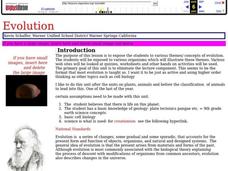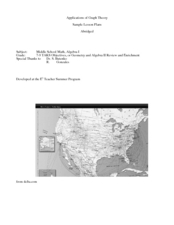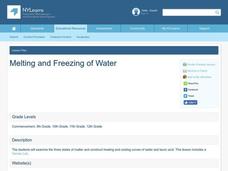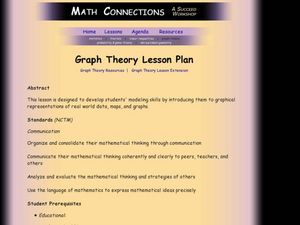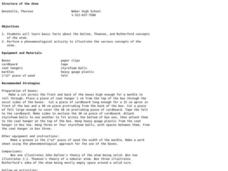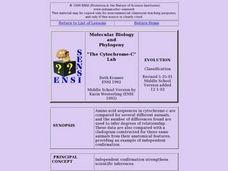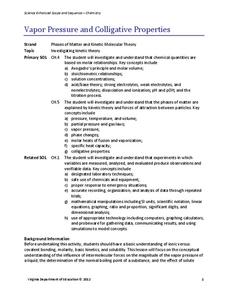Code.org
One-way Functions – The WiFi Hotspot Problem
Pupils attempt to solve the Wireless Hotspot Problem and learn why it is considered a computationally hard problem in the ninth lesson of the series on 12. They also learn about one-way functions and how the Wireless Hotspot Problem is...
Curated OER
Divisibility Rules Using Scientific Calculators
Young learners apply divisibility rules to determine if a number is a factor of another number. They discuss what numbers are factors of another number and identify patterns using divisibility rules.
Curated OER
Probability & Game Theory
Learners explore the concept of probability. In this probability lesson, students perform various probability experiments including flipping a coin, picking m&m's out of a bag, and the birthday problem.
Curated OER
Beans, Beaks and Bears
Students explore evolution. After watching a video on evolution, students perform a variety of experiments using beans which illustrate the concept of evolution.
Curated OER
Evolution
Explore the concept of evolution and cell biology; your class can work in groups to use the internet to view websites on evolution, take a quiz, and complete a lab activity.
Royal Society of Chemistry
A Solid-Solid Reaction between Lead Nitrate and Potassium Iodide
Why is it so difficult to make two solid compounds react? Investigate the concepts of particle collisions and rate of reaction using a quick demonstration. The colorful experiment features two plain, white solids combining to form a...
Curated OER
A Model for Natural Selection- Spaghetti Worms
Does the early bird really get the worm? If so, which color of worm does it prefer? In an exciting and easy week-long field investigation, young field biologists set up a one square meter feeding area for birds. If you have a webcam,...
Curated OER
Application of Graph Theory
Students investigate different online tutorials as they study graphing. In this graphing lesson, students apply the concept of graphs cross curricular and use it to make predictions. They define the purpose and theories behind graphs.
Curated OER
Melting and Freezing of Water
Learners examine the three states of matter. They identify the segments of heating and cooling curves. Students analyze data and create a graph to determine the freezing and melting temperature of water.
Curated OER
Lesson Plan: The Cell- A Historical Perspective
Young scholars discover the impact the invention of the microscope had on scientific discovery as well as the concept of spontaneous generation and the cell theory. Students examine these scientific concepts through a WebQuest and by...
Curated OER
Ionic bonding
Learners explore ionic bonding. They draw examples of ionic bonding and explain the activities of the electrons of the elements. Students use paper plates and candy to draw electron configurations of given atoms.
Curated OER
Graph Theory
Students explore the concept of graph theory. In this graph theory lesson, students participate in hands-on activities that enforce graph theory. Students manipulate graph applets on the internet. Students create a graphical model of...
Curated OER
Theoretical Quantum Physics... For Kids!
Students explore quantum physics by participating in several class activities. In this space-time lesson, students discuss the concepts of time traveling and the anatomy of an atom. Students draw geometric figures and utilize string to...
Curated OER
Acting Like a Hog
Young scholars explore game theory. In this secondary mathematics lesson, students plat the game of HOG using dice and explore the optimal strategies. Young scholars play the game three ways: any number of dice, a fixed...
Curated OER
Creative Ways To Teach Evolutionary Concepts
Learners explore evolutionary concepts in cartoons and lab activities. They describe and explain evolutionary concepts featured in a cartoon and participate in laboratory activities.
Curated OER
What is the Nature of Science?
Conduct a survey about the nature of science with your high schoolers. They will record their responses in a table and then discuss the implications of scientific theory. Note: There are activity sheets, and forms included with this lesson.
Curated OER
Structure of the Atom
Students observe 3 models that show Dalton, Thomson and Rutherford's theories of the structure of the atom. In this structure of the atom lesson plan, students observe each model and write a summary of each theory of the atom.
Curated OER
The Water Cycle
Fifth graders explore the major components of the water cycle. They pay close attention to evaporation, condensation, and precipitation. A water cycle kit is set up in the classroom, which learners observe for a couple of days before the...
Curated OER
VARVES: Dating Sedimentary Strata: Geology, Paleontological Patterns
Young scholars count the number of varves (annual layers of sediment) in shale billets, taken from the Green River Formation in Wyoming. The count is then extended to reflect the entire 260 meters of sediments where the billets originated.
Curated OER
Investigating Evolutionary Questions: Bats, Whales, Reptiles, Birds, Animal Classification
Students are guided through a process in which three questions are addressed by retrieving beta hemoglobin sequences from online databases, and using online tools to compare those sequences in student-selected animals.
Curated OER
M & M Lab
Students investigate how selection occurs in a random population. The concept is that selection affects evolution.They demonstrate how selection occurs and will analyze shifts in the populations. They design their conclusions with M...
Curated OER
The Cytochrome-C Lab
Students examine a method biologists use to try to determine relationships. They examine how amino acid sequences have been determined for a number of proteins, and how scientists can make inferences about DNA based on the amino acid...
Virginia Department of Education
Vapor Pressure and Colligative Properties
Hate to vacuum, but enjoy using a vacuum pump? Explore a instructional activity that starts with a demonstration of boiling water at various temperatures by using a vacuum pump. Then scholars design their own experiments to measure vapor...
Colorado State University
What Is a "Model"?
Model the transfer of energy during a typical 24-hour period. Young scholars use a game-like approach to learning the patterns of heat transfer through the day and night. Groups of four exchange different tokens as the energy...




